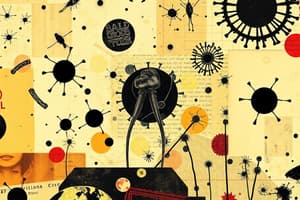Podcast
Questions and Answers
¿Qué área de la microbiología se enfoca en el estudio de las bacterias?
¿Qué área de la microbiología se enfoca en el estudio de las bacterias?
¿Cuál de las siguientes opciones describe mejor a los virus?
¿Cuál de las siguientes opciones describe mejor a los virus?
¿Cuál es uno de los roles beneficiosos de las bacterias mencionado en el texto?
¿Cuál es uno de los roles beneficiosos de las bacterias mencionado en el texto?
¿Qué subcampo de la microbiología se enfoca en el estudio de los hongos?
¿Qué subcampo de la microbiología se enfoca en el estudio de los hongos?
Signup and view all the answers
¿Qué avance científico ha revolucionado el tratamiento de infecciones bacterianas letales, según el texto?
¿Qué avance científico ha revolucionado el tratamiento de infecciones bacterianas letales, según el texto?
Signup and view all the answers
¿Qué campo de la microbiología se centra en el estudio de los virus y es fundamental para el desarrollo de medicamentos antivirales y vacunas?
¿Qué campo de la microbiología se centra en el estudio de los virus y es fundamental para el desarrollo de medicamentos antivirales y vacunas?
Signup and view all the answers
¿Cuál de las siguientes disciplinas investiga los parásitos que viven a expensas de otros organismos?
¿Cuál de las siguientes disciplinas investiga los parásitos que viven a expensas de otros organismos?
Signup and view all the answers
¿Qué área de la microbiología se enfoca en el estudio de hongos, incluyendo levaduras, mohos y setas?
¿Qué área de la microbiología se enfoca en el estudio de hongos, incluyendo levaduras, mohos y setas?
Signup and view all the answers
¿Cuál es el campo de la microbiología que estudia la composición genética de los microorganismos y su interacción con el entorno?
¿Cuál es el campo de la microbiología que estudia la composición genética de los microorganismos y su interacción con el entorno?
Signup and view all the answers
¿Qué área de la microbiología se concentra en el estudio de las bacterias y su impacto en la salud humana y el medio ambiente?
¿Qué área de la microbiología se concentra en el estudio de las bacterias y su impacto en la salud humana y el medio ambiente?
Signup and view all the answers
Study Notes
Microbiology: A Deep Dive into Bacteriology, Virology, Mycology, Parasitology, and Microbial Genetics
Microbiology refers to the study of microorganisms like bacteria, viruses, fungi, and parasites, their genetic makeup, and their interactions with other organisms and their environment. This field encompasses several specialized areas of research, each focused on specific types of microbes and their roles in diverse ecosystems. These subfields include bacteriology, virology, mycology, parasitology, and microbial genetics. Each area contributes significantly to our understanding of the complex world of microorganisms and their impact on human health, agriculture, and the environment.
Bacteriology
Bacteriology examines bacteria, single-celled microorganisms that play a crucial role in various biological processes. They are present everywhere, from soil and water to plants and animals, including humans. Bacteria can be beneficial, such as those involved in nitrogen fixation in legumes, or pathogenic, causing diseases like tuberculosis and cholera. Advances in bacteriology have led to the development of antibiotics, which revolutionized medicine by enabling the treatment of previously deadly bacterial infections.
Viruses
Virology focuses on the study of viruses, infectious agents that can only replicate within the cells of other organisms. Viruses have a range of impacts on their hosts, from causing mild illnesses to inducing severe diseases like AIDS or the common cold. Understanding viruses is crucial for developing antiviral medications and vaccines, which protect against numerous viral infections.
Fungi
Mycology involves the study of fungi, including yeasts, molds, and mushrooms. Fungi play essential roles in decomposition, nutrient cycling, and symbiotic relationships with plants. However, some fungi can cause diseases in plants and animals, such as athlete's foot or ringworm.
Parasitology
Parasitology investigates parasites, organisms that live at the expense of other organisms. Parasites can affect the health of their hosts, leading to a range of diseases in various species. Parasitology is crucial for understanding the complex relationships between parasites and their hosts, as well as for developing strategies to control parasitic infections.
Microbial Genetics
Microbial genetics studies the genetic makeup of microorganisms, focusing on the structure, function, and replication of genes within these organisms. This knowledge is essential for understanding how microbes interact with their environments and develop resistance to antibiotics and other treatments.
In conclusion, microbiology is a vast, interdisciplinary field that underpins many aspects of life, health, and environmental science. By studying bacteriology, virology, mycology, parasitology, and microbial genetics, researchers gain insights into the diverse roles microorganisms play in our world and develop strategies to mitigate their impacts on human health and global ecosystems.
Studying That Suits You
Use AI to generate personalized quizzes and flashcards to suit your learning preferences.
Description
Explora el fascinante mundo de la microbiología, que abarca el estudio de bacterias, virus, hongos, parásitos y genética microbiana. Descubre cómo estos microorganismos interactúan con otros seres vivos y su entorno, y cómo influyen en la salud humana, la agricultura y el medio ambiente.




